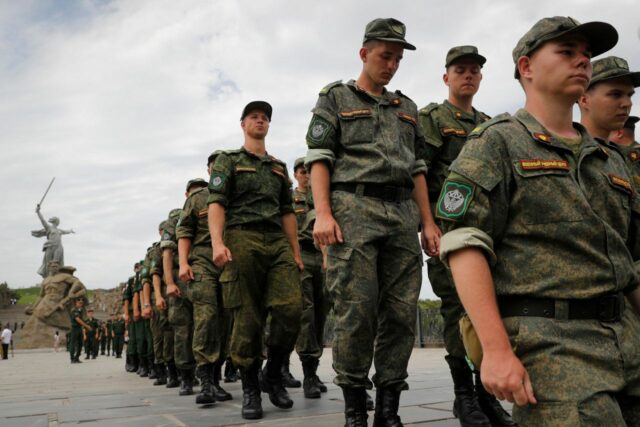
Where Can the Kremlin Go for New Officers?
Publication: Eurasia Daily Monitor Volume: 20 Issue: 118
By:

Since June 2023, Russia has lost two generals during the fighting in Ukraine: Major General Sergei Goryachev, chief of staff of the 35th Combined Arms Army, and Lieutenant General Oleg Tsokov, commander of 144th Guards Motor Rifle Division and deputy commander of the Southern Military District (Lenta.ru, June 13; RBC, July 12). Among other high-level officials, the Russian side also lost Colonel Andrey Stesev, deputy chief of combat training of airborne troops, and Colonel Denis Ivanov, commander of the 123rd Guards Motor Rifle Brigade (73online.ru, June 13; Topwar.ru, July 20).
Since the beginning of Moscow’s full-scale invasion in February 2022, the total amount of Russian officers killed is unknown; however, the number confirmed by open sources exceeds 2,150, and more than 1,550 of those were lieutenants and captains (BBC News Russian, June 23).
Besides those commanders killed in combat, the Russian military leadership dismissed Lieutenant General Ivan Popov, commander of the 58th Combined Arms Army, and Major General Vladimir Seliverstov, commander of the 106th Guards Airborne Division (Rtvi.com, July 12; The Moscow Times, July 15). Popov claims that he was removed from his post for speaking honestly and openly “about problems in the [Russian] army” at the front. According to Telegram channel “Military Informant,” Seliverstov was likely dismissed for his “uncompromising nature” in discussing personnel issues, as he “did not always agree” with the decisions of the Russian High Command.
All these facts raise the question of how Russia will be able to restore its officer corps and provide enough replacement commanders, as the Kremlin continues its campaign against Ukraine despite the mounting military, political and economic troubles.
Facing a lack of manpower, the Russian leadership is developing tougher coercive tools to be used for draft military service as well as future mobilizations—for example, increasing penal fines for dodging military service by many times. This activity confirms that the Kremlin recognizes the troubles that have plagued the recent conscription campaigns as well as the partial mobilization conducted in the fall of 2022. Nevertheless, all these efforts are senseless if there is a serious deficit of commanders, especially at the lower levels (TASS; The Moscow Times, July 20).
Overall, Russia has been unable to find a comprehensive solution to this problem. The deficit of lower-level officers appeared long before 2022. Already in 2018, the Russian Ministry of Defense tried to organize a six-month educational program for those contracted soldiers, sergeants and other noncommissioned officers (NCOs) who were at least 35 years old, had received a degree from a civil university and wanted to become lieutenants (Zvezdaweekly.ru, October 28, 2018). However, the problem was that the amount of applicants for the program was negligible, as most soldiers and sergeants did not plan to stay in the army for too long.
The idea of implementing short-term officer training was revived once again by the end of 2022. Yet, few significant efforts have been taken in this direction, as the pool of potential applicants has inevitably become even lower than it was four years ago due to heavy losses in Ukraine (Moskovskij komsomolets, October 25, 2022).
As a result, the Russian authorities have tried to find alternative methods for filling the personnel gap. Most recently, on July 18, the State Duma passed a bill that temporarily—from January 1, 2024, to January 1, 2028—increases the age range for soldiers, sergeants and NCOs in reserve from 35–50 years old to 40–55 years old, depending on the age group of the reserves. The bill also provides an opportunity to sign contracts for service in an acting mobilization reserve for those soldiers, sergeants, NCOs and officers in reserve whose age falls in the range of 50–70 years old. The acting mobilization reserve presumes regular salaries for the reservists who sign contracts together with regular military training. Moreover, the acting mobilization reserve supposes that reservists may be mobilized for combat activity at any time (Duma.gov.ru, July 18; Sozd.duma.gov.ru, accessed July 20, 2023).
The intention of this bill is clear: The Russian authorities are hoping to convince (or force) as many reservists as possible to sign contracts for the acting mobilization reserve. For soldiers, sergeants and NCOs in reserve, this would give some impetus for officer training. Additionally, the Russian top brass are likely planning to convert the last but still relatively massive generation of Soviet officers in reserve into the officers of the acting mobilization reserve, who are loyal enough and may be motivated for such service by additional pay.
Briefly speaking, the Kremlin is beginning to prepare comprehensively for a long war, looking to survive the coming years despite increased international isolation and any future defeats on the Ukrainian battlefield. That means the only effective method for stopping the current, and future, Russian aggression is a total defeat of Russian forces in Ukraine, which will limit Russia’s ability to fight, as well as regroup, in the long term.



